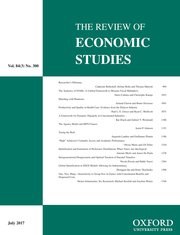
Dyrda, S. and Pedroni, M. (2023). Optimal Fiscal Policy in a Model with Uninsurable Idiosyncratic Income Risk Review of Economic Studies, 90(2):744–780.
-
Affiliated author
-
Publication year2023
-
JournalReview of Economic Studies
We study optimal fiscal policy in a standard incomplete-markets model with uninsurable idiosyncratic income risk, where a Ramsey planner chooses time-varying paths of proportional capital and labor income taxes, lump-sum transfers (or taxes), and government debt. We find that: (1) short-run capital income taxes are effective in providing redistribution since the tax base is relatively unequal and inelastic; (2) an increasing pattern of labor income taxes over time mitigates intertemporal distortions from capital income taxes; (3) the optimal policy increases overall transfers, calibrated initially to the US welfare system, by roughly 50 percent; (4) two-thirds of the welfare gains come from redistribution and the remaining third come mostly from insurance; and (5) redistribution also leads to a more efficient allocation of labor via wealth effects on labor supply—lower productivity households can afford to work relatively less.